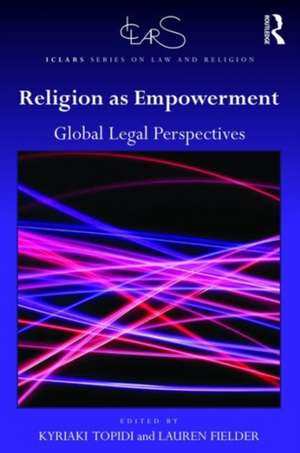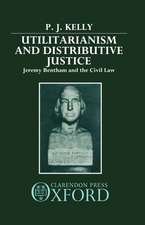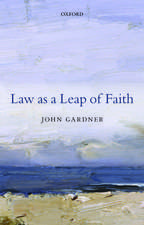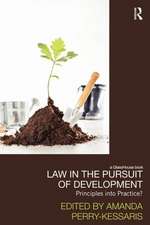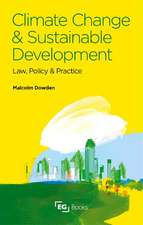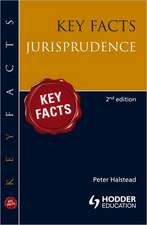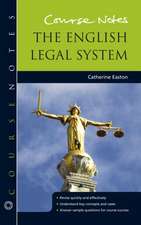Religion as Empowerment: Global legal perspectives: ICLARS Series on Law and Religion
Editat de Kyriaki Topidi, Lauren Fielderen Limba Engleză Hardback – 24 iun 2016
The authors look beyond the rule of law orthodoxy in their consideration of the freedom of religion as a human right and place this discussion in a more plurality-sensitive context. The book sheds more light on the informal and/or customary mechanisms that explain the limited impact of law on individuals and groups, especially in non-Western societies. The focus is on discussing how religion and the exercise of religious rights may or may not empower individuals and social groups and improve access to human rights in general.
This book is important reading for academics and practitioners of law and religion, religious rights, religious diversity and cultural difference, as well as NGOs, policy makers, lawyers and advocates at multicultural jurisdictions. It offers a contemporary take on comparative legal studies, with a distinct focus on religion as an identity marker.
| Toate formatele și edițiile | Preț | Express |
|---|---|---|
| Paperback (1) | 303.22 lei 6-8 săpt. | |
| Taylor & Francis – 11 mai 2018 | 303.22 lei 6-8 săpt. | |
| Hardback (1) | 850.59 lei 6-8 săpt. | |
| Taylor & Francis – 24 iun 2016 | 850.59 lei 6-8 săpt. |
Din seria ICLARS Series on Law and Religion
-
 Preț: 324.03 lei
Preț: 324.03 lei - 17%
 Preț: 259.51 lei
Preț: 259.51 lei -
 Preț: 312.12 lei
Preț: 312.12 lei -
 Preț: 310.41 lei
Preț: 310.41 lei -
 Preț: 310.95 lei
Preț: 310.95 lei -
 Preț: 387.75 lei
Preț: 387.75 lei -
 Preț: 284.78 lei
Preț: 284.78 lei -
 Preț: 385.47 lei
Preț: 385.47 lei - 18%
 Preț: 892.16 lei
Preț: 892.16 lei - 12%
 Preț: 303.22 lei
Preț: 303.22 lei - 17%
 Preț: 259.98 lei
Preț: 259.98 lei - 17%
 Preț: 259.98 lei
Preț: 259.98 lei -
 Preț: 386.51 lei
Preț: 386.51 lei -
 Preț: 387.87 lei
Preț: 387.87 lei - 17%
 Preț: 259.98 lei
Preț: 259.98 lei -
 Preț: 388.68 lei
Preț: 388.68 lei - 17%
 Preț: 259.92 lei
Preț: 259.92 lei - 18%
 Preț: 1001.07 lei
Preț: 1001.07 lei - 18%
 Preț: 1006.07 lei
Preț: 1006.07 lei - 17%
 Preț: 257.08 lei
Preț: 257.08 lei -
 Preț: 381.59 lei
Preț: 381.59 lei - 17%
 Preț: 256.87 lei
Preț: 256.87 lei - 12%
 Preț: 299.25 lei
Preț: 299.25 lei - 17%
 Preț: 258.09 lei
Preț: 258.09 lei -
 Preț: 393.52 lei
Preț: 393.52 lei - 13%
 Preț: 298.19 lei
Preț: 298.19 lei - 18%
 Preț: 901.35 lei
Preț: 901.35 lei - 17%
 Preț: 255.66 lei
Preț: 255.66 lei - 18%
 Preț: 1000.27 lei
Preț: 1000.27 lei - 18%
 Preț: 1004.86 lei
Preț: 1004.86 lei - 18%
 Preț: 1000.27 lei
Preț: 1000.27 lei
Preț: 850.59 lei
Preț vechi: 1142.12 lei
-26% Nou
Puncte Express: 1276
Preț estimativ în valută:
162.76€ • 170.37$ • 135.47£
162.76€ • 170.37$ • 135.47£
Carte tipărită la comandă
Livrare economică 31 martie-14 aprilie
Preluare comenzi: 021 569.72.76
Specificații
ISBN-13: 9781472437594
ISBN-10: 1472437594
Pagini: 338
Dimensiuni: 156 x 234 x 23 mm
Greutate: 0.61 kg
Ediția:1
Editura: Taylor & Francis
Colecția Routledge
Seria ICLARS Series on Law and Religion
Locul publicării:Oxford, United Kingdom
ISBN-10: 1472437594
Pagini: 338
Dimensiuni: 156 x 234 x 23 mm
Greutate: 0.61 kg
Ediția:1
Editura: Taylor & Francis
Colecția Routledge
Seria ICLARS Series on Law and Religion
Locul publicării:Oxford, United Kingdom
Cuprins
Table of Contents
List of Figures and Tables
List of Contributors
Acknowledgements
Chapter 1: Introduction– Werner Menski & Kyriaki Topidi
Part I: Religion AS Law
Chapter 2: Islam as legal (dis)-empowerment: The dynamic interplay between Italian legal provisions and shariah-compliant norms – Federica Sona
Chapter 3: South African Women’s Legal Experiences of Muslim Personal Law – Waheeda Amien
Chapter 4: Decoding Diversity: Experiences with Personal Law in the Lower Courts of Maharashtra – Kalindi Kokal
Chapter 5: When courts do not finish contentious causes: Revisiting the value of religious laws in the Rainbow Nation – Dennis Bonginkosi Xulu
Chapter 6: Shari’a Deconstructed: A New Definition of Islamic Constitutionalism and its enforcement through Positive Law –Pietro Longo
Part II: Religion IN Law
Chapter 7: Engaging Religious Laws, Players and Communities: Confronting Religious Dis-Empowerment – Amos Israel - Vleeschhouwer
Chapter 8: Negotiating religious orthodoxy, state neutrality and religious freedom: The case of the Ahmadiyah controversy in post-Suharto Indonesia – Supriyanto Abdi
Chapter 9: Must the infringement of women’s rights within religions be tolerated? A Swiss perspective – Adrian Loretan
Chapter 10: Polygyny in Sub-Saharan Africa: A Practice that empowers or disempowers women? – Lauren Fielder
Chapter 11: Tolerance of Liberal Values in Romania: Anti-Abortion from Strategies between Religious Belief and Civil Society Mobilisation – Bodgan Mihai Radu and Cosmina Paul
Chapter 12: Public Education and Religious Rights: A Comparative Analysis – Kyriaki Topidi
Chapter 13: Conclusion: The Normative Dialogue between Religion and Law as a Cultural Endeavour: A Plea for Complexity and Context - Kyriaki Topidi
List of Figures and Tables
List of Contributors
Acknowledgements
Chapter 1: Introduction– Werner Menski & Kyriaki Topidi
Part I: Religion AS Law
Chapter 2: Islam as legal (dis)-empowerment: The dynamic interplay between Italian legal provisions and shariah-compliant norms – Federica Sona
Chapter 3: South African Women’s Legal Experiences of Muslim Personal Law – Waheeda Amien
Chapter 4: Decoding Diversity: Experiences with Personal Law in the Lower Courts of Maharashtra – Kalindi Kokal
Chapter 5: When courts do not finish contentious causes: Revisiting the value of religious laws in the Rainbow Nation – Dennis Bonginkosi Xulu
Chapter 6: Shari’a Deconstructed: A New Definition of Islamic Constitutionalism and its enforcement through Positive Law –Pietro Longo
Part II: Religion IN Law
Chapter 7: Engaging Religious Laws, Players and Communities: Confronting Religious Dis-Empowerment – Amos Israel - Vleeschhouwer
Chapter 8: Negotiating religious orthodoxy, state neutrality and religious freedom: The case of the Ahmadiyah controversy in post-Suharto Indonesia – Supriyanto Abdi
Chapter 9: Must the infringement of women’s rights within religions be tolerated? A Swiss perspective – Adrian Loretan
Chapter 10: Polygyny in Sub-Saharan Africa: A Practice that empowers or disempowers women? – Lauren Fielder
Chapter 11: Tolerance of Liberal Values in Romania: Anti-Abortion from Strategies between Religious Belief and Civil Society Mobilisation – Bodgan Mihai Radu and Cosmina Paul
Chapter 12: Public Education and Religious Rights: A Comparative Analysis – Kyriaki Topidi
Chapter 13: Conclusion: The Normative Dialogue between Religion and Law as a Cultural Endeavour: A Plea for Complexity and Context - Kyriaki Topidi
Notă biografică
Dr Kyriaki Topidi is a Senior Lecturer at the School of Law of the University of Lucerne, Switzerland. She is also associate director of the Centre of Comparative Constitutional Law and Religion at UNILU. She teaches and researches on comparative constitutional law with emphasis on religious rights, on which she has published widely.
Lauren Fielder is a Senior Lecturer at the School of Law at the University of Texas, USA. She teaches, writes and speaks about human rights issues in Africa.
Lauren Fielder is a Senior Lecturer at the School of Law at the University of Texas, USA. She teaches, writes and speaks about human rights issues in Africa.
Recenzii
'This is a must read book to everyone who is interested in the intersection of law and religion in the contemporary world. In a rich and interdisciplinary volume, the authors reveal how persistent religious claims are in Western legal systems and offer a normative account of how religion and the rule of law can (and should) coexist in the public sphere and even empower one another. Topidi & Fielder bring an impressive collection of articles that shake-up the traditional thinking. Be ready for an intellectual challenge!'
Liav Orgad, Harvard University, USA
'Religion as empowerment is a wide-ranging collective book exploring the universe of "Law and Religion" from different angles and with reference to various cultural and legal experiences. The overall scenario depicts a post-secular world, where religion is "lurking in the background" as another form of claimed legal authority. Through the lenses of legal pluralism, the authors explore the normative dialogue between religion and law furnishing invaluable insights for legal scholars as well as for practitioners.'
Domenico Amirante, The Second University of Naples, Italy
'This book is about the manifold legal tools provided by official law and by religious and cultural traditions and about their capacity to provide justice. Interdisciplinary case studies of topical interest from various corners of the world accentuate the impact of theoretical legal approaches on individual people’s lives. A recommended reading and a stimulus for further research.'
Wolfgang Wieshaider, University of Vienna, Austria
Liav Orgad, Harvard University, USA
'Religion as empowerment is a wide-ranging collective book exploring the universe of "Law and Religion" from different angles and with reference to various cultural and legal experiences. The overall scenario depicts a post-secular world, where religion is "lurking in the background" as another form of claimed legal authority. Through the lenses of legal pluralism, the authors explore the normative dialogue between religion and law furnishing invaluable insights for legal scholars as well as for practitioners.'
Domenico Amirante, The Second University of Naples, Italy
'This book is about the manifold legal tools provided by official law and by religious and cultural traditions and about their capacity to provide justice. Interdisciplinary case studies of topical interest from various corners of the world accentuate the impact of theoretical legal approaches on individual people’s lives. A recommended reading and a stimulus for further research.'
Wolfgang Wieshaider, University of Vienna, Austria
Descriere
This volume examines how and why legal empowerment is conducive to people acting as fully-fledged legal subjects with regard to the rights stemming from their freedom of belief. At the same time, the book positions itself in the stream of academic literature that questions the thesis that as societies become more modern, they also become less religious. The authors look beyond the rule of law orthodoxy in its consideration of the freedom of religion as a human right and place this discussion in a more plurality-sensitive context. The book thus sheds more light on the informal and/or customary mechanisms that explain the limited impact of law on individuals and groups.
